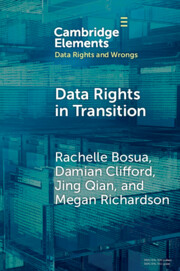Refine search
Actions for selected content:
2 results

Data Rights in Transition
-
- Published online:
- 08 August 2025
- Print publication:
- 04 September 2025
-
- Element
- Export citation
5 - Traditionalist Data Protection Rules
-
- Book:
- The Privacy Fallacy
- Published online:
- 16 November 2023
- Print publication:
- 30 November 2023, pp 88-109
-
- Chapter
- Export citation
